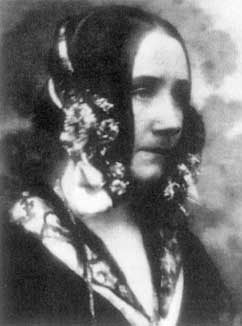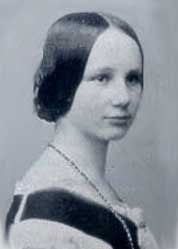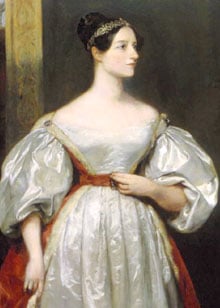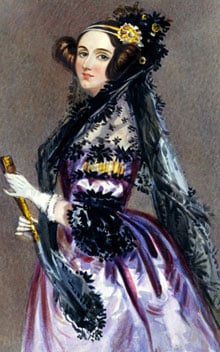Key Points:
- Ada Lovelace was a British mathematician commonly referred to as “the first computer programmer” for writing an algorithm for a computing machine in the mid-1800s.
- Ada Lovelace was the only legitimate child to the famous poet Lord George Gordon Byron, who divorced her mother and left England permanently.
- Charles Babbage was impressed by Lovelace’s intellect and analytical skills, and called her “The Enchantress of Number.”

Who was Ada Lovelace
Ada Lovelace was an English mathematician who wrote an algorithm for a computing machine in the mid-1800s. She has been called “the first computer programmer.”
Early life
Ada Locelace was born in England on December 10, 1815. She was the only legitimate child to the famous poet Lord George Gordon Byron. Ada Lovelace’s family dynamic was complicated – Lord Byron’s marriage to Ada’s mother, Lady Anne Isabella Milbanke Byron was an unhappy one. Lord Byron hoped for a boy, and was disappointed when Lady Byron gave birth to a girl. Ada Lovelace (then Byron) was named after Byron’s half-sister, Augusta Leigh, and was called “Ada” by Lord Byron.
On January 16, 1816, 5 weeks after Ada was born, the couple separated. Lord Byron made no attempt to claim his parental rights and only asked that his sister keep him informed of Ada’s welfare. On April 21, 1816 Lord Byron signed the deed of separation and left England. Lady Byron spent her life speaking ill about her husband, and Ada Lovelace became infamous in Victorian society. Lovelace never saw her father again. He died in Greece when she was 8 years old.
Science and math were not standard for women at the time, but Lovelace’s mother believed that rigorous studies would prevent Lovelace from developing her fathers temperament. She insisted on having tutors teach Lovelace mathematics and science which was unusual for an aristocratic girl in the mid-1800’s. Lovelace’s mother also forced her to lie still for long periods of time to help her develop self control. From the beginning Locelace showed a talent for numbers and languages. Ada was tutored by William Frend, William King, and Mary Somerville.

Lovelace and her mother were not close, and Locelace was left in the care of her maternal grandmother, Lady Milbanke. During this time, Lady Byron had to present herself as a loving mother to the society to show maternal concern and keep custody of Lovelace.
At 12, Ada decided she wanted to fly. Her first project was to construct wings. She examined the anatomy of birds and investigated different materials for the wings. It ranged from paper, wires, and feathers. Ada decided to write a book – Flyology.
Lovelace was often ill and in June 1829, she was paralyzed after getting the measles and needed continuous bed rest for about a year. By 1832 she was able to walk on crutches. Her illnesses did not hold her back – Lovelace spent this time developing her mathematical and technological skills.
In 1833 Ada had an affair with a tutor. She tried to elope, but the tutors’ relatives knew her and contacted her mother. Lady Byron covered up the incident to prevent a scandal.
Career
Ada Lovelace was always interested in scientific developments and facts. In 1844 she told her friend Woronzow Greig that she wanted to build a mathematical model for how the brain has thoughts and feelings. Unfortunately, Ada never achieved this.
Lovelace’s curiosity in the brain came from her mother’s obsession with Ada’s inherited “madness.” During her research, she visited Andrew Crosse, an electrical engineer, to learn how to carry out electrical experiments. In 1844, Lovelace wrote a review on Baron Karl von Reichenbach’s paper “Researches on Magnetism,” however it was not published and did not get past a first draft.
First Computer Program
In June 1833, Lovelace was introduced to Charles Babbage through their mutual friend Mary Somerville. Later that month, Babbage showed Lovelace his prototype for his Difference engine. She was fascinated with the machine, and Babbage was impressed by Lovelace’s intellect and analytical skills. He called her “The Enchantress of Number.”
In 1840 Babbage was giving a seminar about his Analytical Engine at the University of Turn. Luigi Menagrea, a young Italian engineer and the future Prime Minister of Italy, transcribed the lecture into French. His transcription was published in October 1842, and Ada Lovelace translated this paper into English.
She translated the paper and added notes. Ada Lovelace spent about a year doing this, and the notes were more extensive than the paper. Her notes were labeled alphabetically from A to G. In note G she outlined an algorithm for the Analytical Engine to compute Bernoulli numbers. This is to be considered the first published algorithm, and Ada Lovelace is quoted as the first computer programmer for this reason. The engine was never completed, so her program was never tested. It was published in the Taylor’s Scientific Memoirs under the Initials AAL in September 1843.
Once the papers were published Lovelace and Babbage had a falling out. Babbage tried to leave his statement as an unsigned preface. Leaving it unsigned would make his statement and Lovelace’s look like a joint effort. Babbage asked Lovelace to withdraw the paper, and she refused. Their friendship did recover.
In 1953 Ada Lovelace’s notes on Babbage’s Analytical Engine were republished as an appendix to B.V. Bowden’s “Faster than Thought: A Symposium on Digital Computing Machines.” The engine is recognized as an early model for a computer. Ada’s notes are seen as a description of a computer and software.
In her notes, Lovelace also emphasized the difference between the Analytical Engine and previous calculating machines. She focused primarily on its ability to be programmed to solve problems of any complexity. She realized the device extended far beyond number crunching.
Since Babbage conceived the Analytical Engine there is some controversy over the fact that Ada Lovelace is the first computer programmer. It is said that Babbage prepared the program, and Lovelace detected the issue and wrote an analytical piece. Ada Lovelace did not write it, but she was the first to see the potential of the Analytical Engine.

What is Ada Lovelace known for?
Between 1842 and 1843, Lovelace translated Luigi Menabrea’s article on Babbage’s Analytical Engine. She published her notes on the Analytical engine, which ended up being 3x longer than the article itself. Because of her written work, Lovelace is considered by many the first computer programmer, and her method is called the world’s first computer program.
Ada Lovelace: Marriage, divorce, children, and personal life
Net Worth
Between $1 Million – $5 Million
Marriage
On July 8, 1835, Ada Lovelace married William King, the 8th Baron King, becoming Lady King. Starting in 1844, Lovelace began a relationship with Andrew Crosse’s son, John Crosse. As part of a legal agreement, Crosse destroyed many of their correspondences after Lovelace’s death.
Children
William King and Ada Lovelace were a family of 5. They had three children: Byron, Anne Isabella (called Annabella), and Ralph Gordon.
Tragedy
On November 27, 1852, Lovelace died from uterine cancer. She was sick for several months and initially asked Charles Babbage to be her executor. During this time, Ada had a religious transformation, and her daughter, Annabella became her executor.
Annabella took command over who Ada was in contact with and excluded all of her friends and family. During this time, Ada Lovelace’s husband abandoned her after she confessed something to him. No one knows what she told him.
Lovelace is buried next to her father.

Ada Lovelace Day
Ada Lovelace Day was founded by Suw Charmen-Anderson in 2009. It’s now scheduled every year on the second Tuesday of October. It was created to raise awareness for women in STEM (science, technology, engineering, and maths). Ada Lovelace Day is an international celebration that encourages women in STEM careers.
Ada Lovelace Quotes
Here are several influential Ada Lovelace quotes:
- “That brain of mine is something more than merely mortal; as time will show.”
- “If you can’t give me poetry, can’t you give me poetical science?”
- “I never am really satisfied that I understand anything; because, understand it well as I may, my comprehension can only be an infinitesimal fraction of all I want to understand about the many connections and relations which occur to me, how the matter in question was first thought of or arrived at…”
- “Religion to me is science and science is religion.”
- “The more I study, the more insatiable do I feel my genius for it to be.”
- “Your best and wisest refuge from all troubles is in your science.”
- “The science of operations, as derived from mathematics more especially, is a science of itself, and has its own abstract truth and value.”
- “Imagination is the Discovering Faculty, pre-eminently. It is that which penetrates into the unseen worlds around us, the worlds of Science.”
- “Mathematical science shows what is. It is the language of unseen relations between things. But to use and apply that language, we must be able to fully to appreciate, to feel, to seize the unseen, the unconscious.”
- “As soon as I have got flying to perfection, I have got a scheme about a steam engine.”